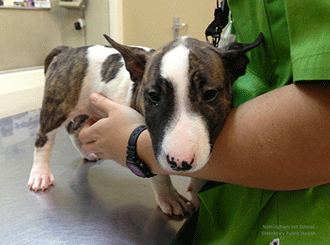
Rhonda Stallings, DVM, Arroyo Veterinary Hospital, Sonoma, CA
Many canine illnesses may not have symptoms at the onset. Here is a recent example: A 3½-year-old Great Pyrenees came to my hospital because the insides of his eyelids were red and inflamed. On exam we found his lymph nodes to be very enlarged. On his blood work, the laboratory identified cancer cells in his complete blood count (CBC). This dog was not showing any symptoms of cancer. He is now being treated for stage-5 lymphoma.
While this is an extreme example, it highlights why doing routine blood and urine testing is important. Because dogs age much faster than humans, they go from puppies to geriatrics in just a few years. Their diseases seem to develop faster, as well as progress more quickly.
So, what can we do to ensure our beloved pets live long and healthy lives?
The blood work we routinely perform at Arroyo Veterinary Hospital includes a complete blood cell count (CBC). A CBC helps us identify problems such anemia, infection, inflammation, dehydration, bleeding issues and autoimmune diseases. If we test regularly, we can identify diseases early, before symptoms appear. We are then able to start treatment quickly, often with better outcomes.
Additionally, the routine blood chemistries included in these tests can help us assess kidney, liver, pancreatic and endocrine system functioning. Doing routine blood tests, while your dog is healthy and with no symptoms of disease, creates a “baseline” for future testing.
Taking urine samples is also extremely helpful, as it can detect diseases much sooner than the symptoms appear. Many dogs walk around with urinary tract infections and don’t show us any recognizable symptoms.
Talk to your veterinarian about routine testing and potential financial impact of early disease detection vs. treating a disease that is found in the later stages. This article on the importance of blood work for healthy pets will also provide you with more information.




